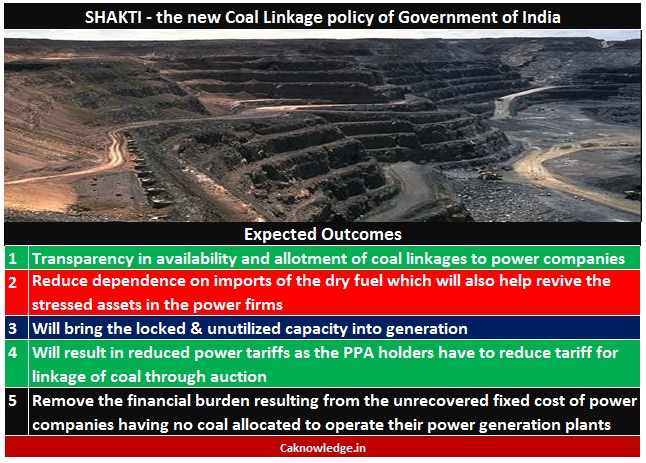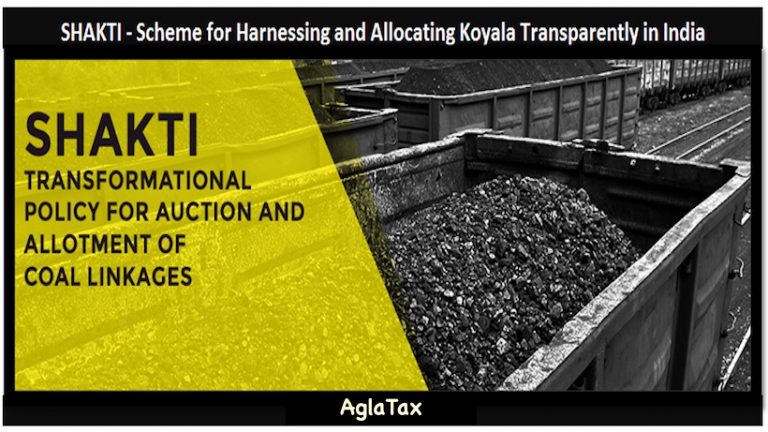SHAKTI: Have you ever heard in any of PM Modi or any other politician’s speaking about the scams that were perpetrated during the UPA government? If so, you must be aware of the Coal gate scam involving the irregular allocation of coal blocks to the power companies. This scandal came into the limelight with massive coverage by main stream media after the Comptroller and Audit General of India brought it into the parliament in its report pointing out the flawed & non-transparent allocation of almost 194 coal blocks to various companies causing loss to the state exchequer.
In order to bring a transparent bidding-based mechanism for allocating fresh coal linkages, Modi Government has formulated and approved a new scheme called “Shakti” that will have many positive developments in country’s thermal power sector where more than 60% of the power generation happens through coal.
Objectives
This new policy aptly named SHAKTI which stands for “Scheme for Harnessing and Allocating Koyala Transparently in India” has been approved by the cabinet in May 2017. The sole objective of this policy is to transparently auction the long-term coal linkages to power companies to meet the increasing demand for the coal resulting from the continuous surge in requirement for thermal power.
Salient features of “Shakti”:
1. For a smooth transition from existing regime to new regime under Shakti, it was facilitated that Thermal Power Plants (TPP) having Letter of Assurance (LOA) shall be eligible to sign Fuel supply agreement (FSA) after ensuring that the plants are commissioned, respective milestones are met, all specified conditions of the LOA fulfilled within specified timeframe and where nothing adverse is detected against the LOA holders and the TPPs are commissioned before 31.03.22 TPPs that could not be commissioned by 31.03.15 shall now be eligible for coal drawal if the plants are commissioned before 31.03.22.
2. Allocation of coal linkages for power sector shall be based on auction of linkages or through Power Purchase Agreement (PPA) based on competitive bidding of tariffs. Coal extraction will be permitted against valid Long Term PPAs and to be concluded Medium Term PPAs.
3. This is not applicable to the ‘State and the Central Power Generating companies’ such as NTPC, AP Genco & their joint ventures, and the exceptions provided in Tariff Policy, 2016. It was provided that they will continue to get coal linkages as per the recommendations of the ministry of power.
4. The future coal linkages for the supply of coal to Independent Power producers (IPP) without PPA shall be on the basis of the auction were bidding for linkage shall be done over the Notified Price of Coal Company. The LOA shall be issued to the successful bidders and FSA signed after meeting the terms of LOA.
5. Linkages shall be earmarked to the States where any linkage quantity unutilized for two years shall lapse. States may indicate the earmarked linkages to the Distribution companies (DISCOMs)/SDAs, who may:
- a. Undertake tariff-based competitive bidding on long-term and medium-term PPAs and allot these linkages to the successful bidder or
- b. Assign these linkages to capacities that are covered under exceptions and proviso clauses of Para 5.2 of the Tariff Policy dated
6. Power requirement of a group of States can be aggregated and procurement of power on tariff-based bidding shall be made by the designated agency for which coal linkages are earmarked
7. Coal linkages, for IPPs having PPA based on imported coal, shall be made available through a transparent bidding process.

Expected outcomes
| 1 | Transparency in availability and allotment of coal linkages |
| 2 | Reduce dependence on imports of the dry fuel which will also help revive the stressed assets in the power firms |
| 3 | Will bring the locked & unutilized capacity into generation |
| 4 | Will result in reduced power tariffs as the PPA holders have to reduce the tariff for linkage of coal through auction |
| 5 | Due to the unavailability of coal linkages, many power companies are under the burden of fixed costs that are in no way compensated by usage of installed capacity. This will get alleviated through the policy. |
| 6 | Better performing power companies will repay their debts relieving the banks from significant portion of their NPAs |
Recommended
